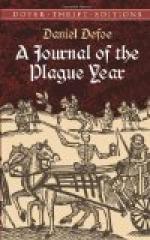The brother of this man was a seaman too, but somehow or other had been hurt of[107] one leg, that he could not go to sea, but had worked for his living at a sailmaker’s in Wapping or thereabouts, and, being a good husband,[108] had laid up some money, and was the richest of the three.
The third man was a joiner or carpenter by trade, a handy fellow, and he had no wealth but his box or basket of tools, with the help of which he could at any time get his living (such a time as this excepted) wherever he went; and he lived near Shadwell.
They all lived in Stepney Parish, which, as I have said, being the last that was infected, or at least violently, they staid there till they evidently saw the plague was abating at the west part of the town, and coming towards the east, where they lived.
The story of those three men, if the reader will be content to have me give it in their own persons, without taking upon me to either vouch the particulars or answer for any mistakes, I shall give as distinctly as I can, believing the history will be a very good pattern for any poor man to follow in case the like public desolation should happen here. And if there may be no such occasion, (which God of his infinite mercy grant us!) still the story may have its uses so many ways as that it will, I hope, never be said that the relating has been unprofitable.
I say all this previous to the history, having yet, for the present, much more to say before I quit my own part.
I went all the first part of the time freely about the streets, though not so freely as to run myself into apparent danger, except when they dug the great pit in the churchyard of our parish of Aldgate. A terrible pit it was, and I could not resist my curiosity to go and see it. As near as I may judge, it was about forty feet in length, and about fifteen or sixteen feet broad, and at the time I first looked at it about nine feet deep. But it was said they dug it near twenty feet deep afterwards, in one part of it, till they could go no deeper for the water; for they had, it seems, dug several large pits before this; for, though the plague was long a-coming[109] to our parish, yet, when it did come, there was no parish in or about London where it raged with such violence as in the two parishes of Aldgate and Whitechapel.
I say they had dug several pits in another ground when the distemper began to spread in our parish, and especially when the dead carts began to go about, which was not in our parish till the beginning of August. Into these pits they had put perhaps fifty or sixty bodies each; then they made larger holes, wherein they buried all that the cart brought in a week, which, by the middle to the end of August, came to from two hundred to four hundred a week. And they could not well dig them larger, because of the order of the magistrates, confining them to leave no bodies within six feet of the surface; and the water coming on at about seventeen or eighteen feet, they could not well, I say, put more in one pit. But now, at the beginning of September, the plague raging in a dreadful manner, and the number of burials in our parish increasing to more than was[110] ever buried in any parish about London of no larger extent, they ordered this dreadful gulf to be dug, for such it was rather than a pit.




